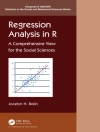Effective treatment and preparation for successful reintegration can be better achieved if the needs and risks of incarcerated offenders are taken into consideration by correctional practitioners and scholars.
Special Needs Offenders in Correctional Institutions offers a unique opportunity to examine the different populations behind bars (e.g. chronically and mentally ill, homosexual, illegal immigrants, veterans, radicalized inmates, etc.), as well as their needs and the corresponding impediments for rehabilitation and reintegration. Author Lior Gideon takes a rehabilitative and reiterative approach to discuss and differentiate between the needs of these various categories of inmates, and provides in depth discussions-not available in other correctional texts-about the specific needs, risks and policy recommendations when working with present-day special needs offenders. Each chapter is followed by suggested readings and relevant websites that will enable readers to further enhance understanding of the issues and potential solutions discussed in the chapter. Further, each chapter has discussion questions specifically designed to promote class discussions. The text concludes with a theoretical framework for future policy implications and practices.
Daftar Isi
Preface
Acknowledgements
1. Introduction – Special Needs Offenders – Lior Gideon
2. Juveniles Behind Bars – Traqina Quarles Emeka and Nelseta Waters
3. Incarcerated Female: A Growing Population – Lisa Pasko and Meda Chesney-Lind
4. Pregnancy and Motherhood Behind Bars – Zelma W. Henriques & Bridget P. Gladwin
5. Chronically Ill Inmates – Elizabeth C. Dretsch
6. Mentally Ill Inmates – Jails and Prisons as the New Asylum – Lorie A.L. Nicholas and Gerard Bryant
7. Older and Geriatric Offenders: Critical Issues for the 21st Century – Ronald H. Aday and Jennifer J. Krabill
8. Gay and Lesbian Inmates – Sexuality and Sexual Correction Behind Bars – Christoper Hensley, Helen Eigenberg and Lauren Gibson
9. Special Needs Offenders in Correctional Institutions – Inmates Under Protective Custody – Holly A. Miller
10. Sex Offenders Behind Bars: Considerations for Assessment and Treatment – Christian Maile, Cynthia Calkins Mercado, and Elizabeth Jeglic
11. Redemption From the Inside-Out: The Power of Faith-Based Programming – Barbara H. Zaitzow and Richard S. Jones
12. Incarcerated Veterans – Joel Rosenthal and Jim Mc Guire
13. Special Needs Offenders in Correctional Institutions: Death-Sentenced Inmates – Mark D. Cunningham
14. Immigrants Under Correctional Supervision: Examining the Needs of Immigrant Populations in a Criminal Justice Setting – Harald E. Weiss and Lauren M. Vasquez
15. Homeland Security and the Inmate Population: The Risk and Reality of Islamic Radicalization in Prison – Aaron Rappaport, Tinka Veldhuis, and Amos Guiora
16. Substance Use and Addiction and American Prison and Jail Inmates – Hung-En Sung, Linda Richter, Roger Vaughan, and Susan E. Foster
17. Conclusion: Assess, Progress, Success – Lior Gideon
Tentang Penulis
Lior Gideon, Ph D, is a Professor at John Jay College of Criminal Justice in New York City. He specializes in corrections-based program evaluation and focuses his research on rehabilitation, reentry, and reintegration issues and in particular by examining offenders’ perceptions of their needs. His research interests also involve international and comparative corrections-related public opinion surveys and their affect on policy. To that extent, Dr. Gideon has published several manuscripts on these topics, including two previously published books on offenders needs in the reintegration process: Substance Abusing Inmates: Experiences of Recovering Drug Addicts on Their Way Back Home (2010, Springer), and Rethinking Corrections: Rehabilitation, Reentry, and Reintegration (with Hung-En Sung, 2011, SAGE). His other works were recently published in The Prison Journal, the International Journal of Offender Therapy and Comparative Criminology, and the Asian Journal of Criminology. Dr. Gideon earned his Ph D from the Faculty of Law, Institute of Criminology at the Hebrew University in Jerusalem, Israel, and completed a postdoctoral fellowship at the University of Maryland’s Bureau of Governmental Research.












